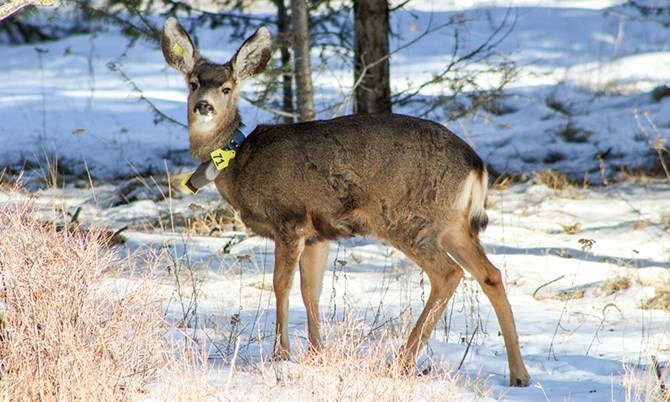
A UBC Okanagan study is looking at reason for the decline in mule deer populations in the province.
Image Credit: SUBMITTED / UBC Okanagan
April 05, 2022 - 6:00 AM
The pros may outweigh the cons but a mule deer researcher says there are parts of the Okanagan Connector’s fencing that are making it easier for predators to prey upon deer.
The deer seem to migrate just fine on the two underpasses and one overpass on Highway 97C, said PhD candidate Chloe Wright, from UBC Okanagan, who is a part of the Southern Interior Mule Deer Project, the largest mule deer project in B.C.'s history.
Wright gave a presentation on the mule deer project earlier this week, March 29, through Zoom with the B.C. Wildlife Federation.
READ MORE: Documentary highlights largest mule deer project in B.C.'s history
The project aims to determine why the mule deer population is declining in the Interior. Deer are currently being tracked in the Boundary, the Westside of Okanagan Lake and in the Bonaparte Plateau areas using collars and cameras, collecting data to determine how to restore the deer populations.
The mule deer generally know where the underpasses and overpasses are along the Okanagan Connector and how to use them, Wright said.
“We haven't dived into this to see if it had a large impact but it does seem like there are certain parts of the fence where we do see more deer dying because they seem to be chased by coyotes or other predators into the fence and they do get a bit stuck and then they died,” she said.
So that’s not great but if we also think that if we took the fence away that more deer would get killed on the highway than by the predators trapping them on the fence so it’s kind of a lose-lose situation,” she said, adding the fences are also protecting people’s lives by preventing deer and vehicle accidents.
Wright said the deer could always use more underpasses and overpasses — and the deer are using them.
“There’d probably be no harm in creating more but I’m not an engineer,” she said.
READ MORE: Cougars and mule deer have a tight relationship, UBC Okanagan researcher says
Adam Ford, the UBCO biologist spearheading the mule deer project, said one of the biggest determining factors in deer mortality is their access to food in the late summer which determines how well the animals do over the winter.
“If they deplete their reserves or don’t get enough during the summer, it can make their winter difficult,” he said, adding it’s not just one fence that is the problem.
“It’s going to have a net positive effect on mule deer survival, that’s for sure, especially on a busy road like Highway 97,” he said.
Mule deer typically migrate to higher summer elevations in the spring, chasing the greenery and return to lower elevation winter ranges, Wright said, meaning twice per year they spend more time in potentially dangerous areas as they migrate since they are most familiar with their summer and winter ranges.
Mule deer are creatures of habit. During migration, they can travel up to 100 kilometres to reach their destination. They also show low flexibility in where they migrate depending on the weather, she said.
“This is, unfortunately, a bummer for mule deer as flexibility can provide an advantage. Species that are able to switch migratory behaviours… and also those that can shift their routes are more resilient to land-use changes,” she said.
Deer are most likely to choose areas that are mid-range elevations, south-facing slopes, grasslands and uncut forests, Wright said. In the Okanagan, deer selected steeper slopes and areas farther from roads.
Visit the B.C. Wildlife Federation's YouTube channel to view Wright's full presentation.
To contact a reporter for this story, email Carli Berry or call 250-864-7494 or email the editor. You can also submit photos, videos or news tips to the newsroom and be entered to win a monthly prize draw.
We welcome your comments and opinions on our stories but play nice. We won't censor or delete comments unless they contain off-topic statements or links, unnecessary vulgarity, false facts, spam or obviously fake profiles. If you have any concerns about what you see in comments, email the editor in the link above.
News from © iNFOnews, 2022